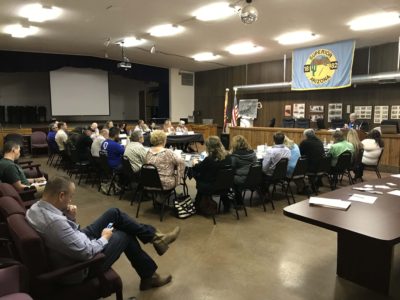
Superior was the site of a regional conference on blight.
The Copper Corridor Economic Development Coalition in conjunction with the Southern Gila County Economic Development Corporation conducted a regional Rural By Choice Forum. The topic for the forum? Blight.
The communities throughout the Copper Corridor have all faced ongoing problems with abandoned and dilapidated structures and negligent property owners. Compounding the problem, each of the communities face lack of financial resources and staff resources to truly combat the problem effectively.
One of the key issues that the forum addressed was the property tax valuations and the appeal process on property taxes. For several communities in the region, there are properties where the property tax valuations are appealed even when there are functional businesses on the same block. The appeal process is often conducted and granted by the state Board of Equalization, which is appointed by the Governor. The forum attendees are hoping to change that policy to allow local communities to comment or weigh in on any property tax appeals.
Leaders from throughout the Corridor shared their experiences. Two panel discussions were held which included local officials sharing what they are doing to combat blight and a panel of representatives from the Arizona Department of Environmental Quality shared resources on the Brownfields grant program that is available though the agency to help assess and repair environmental problems in buildings. They also shared various resources that are available through Keep Arizona Beautiful programs.
Local entities sharing their experiences were Todd Pryor with the Town of Superior who shared the current strategy the Town is taking to deal with blighted and abandoned properties. Sue Anderson with the Superior Chamber of Commerce and Michelle Yerkovich, Code Enforcement Officer with the City of Globe, both shared their recent successes in managing blight and hosting community clean ups.
The day long event included a “Listening Lunch” with Senator Frank Pratt, Rep. TJ Shope and Rep. David Cook. Forum attendees took the information that they learned during the forum to discuss their concerns and share their need for resources and potential policy changes. The legislators were helpful and informative to the attendees, asking them to send in additional information so the issues can be studied further.
